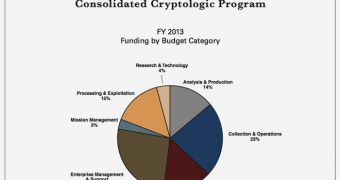The US spy industry has a black budget, so Americans have never known how much they're paying to have their emails read by bitter exes at the NSA. But once again, thanks to Edward Snowden's bravery, the Washington Post was able to put a number on the NSA's and the other spy agencies' budgets.
It's hardly shocking that the US spends tens of billions on its spy apparatus each year and that the budget has increased, by double digit figures, each year for more than a decade.
The Washington Post wasn't able to publish too much information from the documents they obtained from Snowden, since much of the data is sensitive.
But even some rough figures were enough to illustrate a very troubling fact, one that should have been obvious to anyone paying attention, that the US spy agencies are pouring a lot of money and a lot of effort into breaking the encryption regularly used by Internet communication or to store and transmit files securely.
At this point, US spy agencies spend a combined $11 billion (€8.3 billion) for the Consolidated Cryptologic Program. The program employs 35,000 people from the NSA and the armed forces. It's safe to assume that a lot of that effort goes towards breaking encryption.
After all, that's why the NSA is storing everything it can grab, encrypted or not. It hopes that files and communication that may be unbreakable now will become accessible in the future.
The web is moving towards more encryption, more and more sites use HTTPS connections by default, even Wikipedia now. But not all of them. The assumption is that current cryptographic algorithms are unbreakable, at the moment, but, of course, no one knows what the NSA is actually capable of.
In fact, a report last year indicated that the agency made an "enormous breakthrough" in the field several years back. The new document makes similar claims, with Director of National Intelligence James Clapper talking about "investing in groundbreaking cryptanalytic capabilities to defeat adversarial cryptography and exploit internet traffic."

 14 DAY TRIAL //
14 DAY TRIAL //